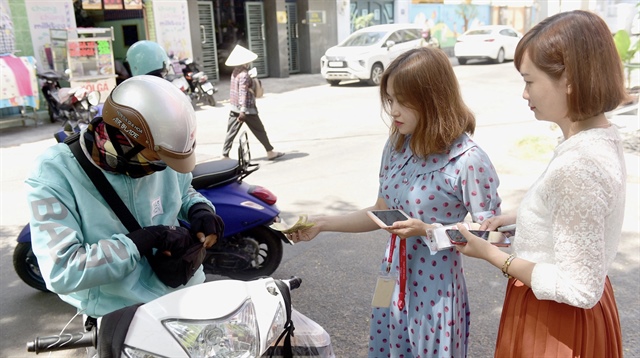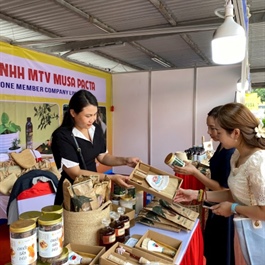Gojek, Baemin withdrawals give lesson, create chance for food delivery apps in Vietnam
Gojek, Baemin withdrawals give lesson, create chance for food delivery apps in Vietnam
Despite spending millions of U.S. dollars on discounts and promotional programs to attract users, tech-based food delivery service providers Gojek and Baemin decided to withdraw from the Vietnamese market, one of the busiest in Southeast Asia, leaving behind a valuable lesson and a big but challenging chance for other players.

A Baemin driver delivers food to customers in Phu Nhuan District, Ho Chi Minh City. File photo: Quang Dinh / Tuoi Tre |
Vietnam’s online market for food delivery is forecast to thrive strongly in 2024, with its growth being able to surpass the US$1.4 billion figure recorded last year, according to a report by research firm Momentum Works.
However, it is not easy at all to tap the potential market.
The competition in online food delivery among ride-hailing apps is becoming more intense.
To make them more attractive to customers, these tech-based platforms have rushed to launch a series of promotional programs, heating up the local market and posing financial risks at the same time.
As a result, after a run-down period, two unicorns from Indonesia and South Korea, namely Gojek and Baemin, decided to leave the intensely competitive Vietnamese market.
In spite of spending big on technology and advertising in Vietnam, in the hope of paying off in the market, Gojek failed to cover its huge cost to maintain operations.
The Indonesian tech firm will exit the Vietnamese market on September 16.
In early 2024, Baemin pulled out of Vietnam after pouring hundreds of billions of Vietnamese dong into its promotional programs. (VND1 billion = $40,556)
Nguyen Tuan, who had previously worked for a food delivery app in Vietnam, supposed that in the current race, food delivery apps are facing a big challenge over prices.
An online order of a dish can total up to VND80,000 ($3.2), including the dish price, a delivery fee, and other charges, deterring customers from placing it, he explained.
As such, these apps must offer discounts and vouchers to delight users.
Grab, which is dominanting the Vietnamese ride-hailing market, offered big discounts sometime to retain its customers.
The competition is seen as a long-term race for moneybags.
Tuan also said that the withdrawals of Gojek and Baemin opened a wider door for local firms such as BeFood and Loship to expand their presence.
BeFood, managed by ride-hailing service supplier Be, has yet to surpass its rivals GrabFood and ShopeeFood.
However, Be is jumping on the bandwagon of goods delivery and online shopping apart from trying to close the gap with these rivals thanks to backing from VPBankS.
Meanwhile, homegrown delivery service supplier Loship is enhancing its foray into food and goods delivery, along with online retail.
To successfully fill the space after Gojek and Baemin left Vietnam, BeFood and Loship must be well-prepared for financial health, technology, and the ability to manage a complicated ecosystem.
Linh, an office worker in Ho Chi Minh City, aired her concerns over a reduction in promotional programs for food delivery services, saying, “I am afraid that services offered by Grab and ShopeeFood will not be as attractive as they were before since some of their rivals have quit the race.”
She was also worried about the possibility of higher prices and degraded quality.
Besides, the users of these apps might have to pay more fees when they place an order, while partner drivers would only receive a small delivery charge.
Meanwhile, the apps would gain a bigger profit from both drivers and customers, and even from restaurants.
Therefore, many users expect the Vietnamese apps to succeed in conquering the food delivery market to heighten the competition.
Nguyen Ngoc Luan, general director of a food and beverage trading and production firm, said that Vietnam’s food delivery market remains promising.
Though Baemin and Gojek left the market, the race keeps going on.
A key takeaway from the two giants is that tech-based food delivery services should build a more comprehensive ecosystem, encompassing shopping and medicine delivery, among other services, to move toward sustainability.
“These platforms should prioritize delivering reliable services to build customer trust and create genuine value,” Luan said.
A representative from a Vietnam-based platform told Tuoi Tre (Youth) newspaper that to thrive in the competitive Vietnamese food delivery market, companies must focus on creating real value for users and partners, rather than seeking market dominance.
Grab, Be, and ShopeeFood feature various services to suit all customers’ needs.
Vietnam’s ride-hailing market is experiencing fierce competition, with Grab controlling it, and Be and EV-taxi service supplier Xanh SM emerging so fast.
Xanh SM, run by Green and Smart Mobility Joint Stock Company (GSM), owned by dollar billionaire Pham Nhat Vuong, has quickly gained its popularity thanks to the use of eco-friendly vehicles, raking in over VND20.1 trillion ($819 million) in revenue in 2023.
Meanwhile, Be is not only focusing on bettering its ride-hailing service, but also introducing a wide range of services to build a comprehensive ecosystem, given a VPBankS investment of VND739.5 billion ($30 million).























